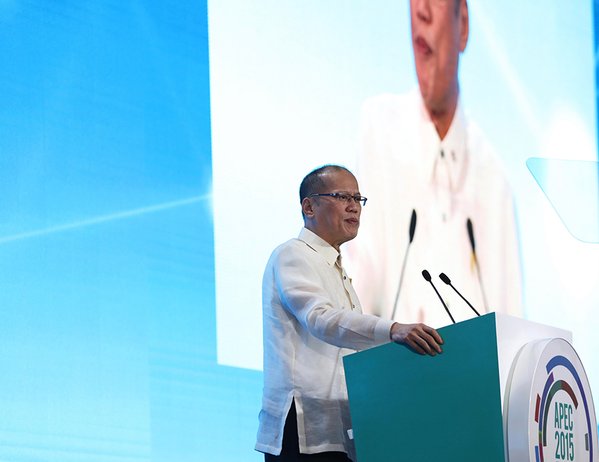Aquino: Apec not limiting, allows leaders to think out of the box

President Benigno Aquino III heralds his administration’s support for smell and medium enterprises during the Apec SME Summit. PHOTO FROM PHILIPPINE GAZETTE
President Benigno Aquino III on Tuesday said he is impressed by the concept of the Asia-Pacific Economic Cooperation (Apec) and the fact that it is unlike other regional partnerships.
“Apec is unique in that it does not produce binding commitments. This only means that we are not confined by certain limits: leaders can think out of the box; discussions can be more freewheeling,” Aquino told the audience at the Apec Small-Medium Enterprises Summit in Makati.
“Some might think that this is an obstacle to productivity. They would be mistaken. When we come together in Apec, we are united by the desire to bring stability, security, and prosperity to our peoples,” he explained.
READ: Apec’s globalization hurts local SMEs
Aquino said many significant commitments on free and open trade started as discussions during the Apec.
However, he said government also needs the help of the private sector.
“Positive change takes place on the ground, and requires the partnership of men and women like you,” he said.
Aquino said his mother, former President Corazon Aquino, focused on microfinance to help “poor Filipino entrepreneurs to take hold of their own destinies.” He said this helped reduce poverty levels.
“In a very real way, my mother’s belief has been translated into our inclusive growth agenda. From the beginning, we have never been content to simply grow the economy and wait for the benefits to trickle down to our people,” he said.
He said investing in health, education and other social services allows Filipinos to participate in economic growth. He reiterated his belief that the people is the Philippines’ “strongest competitive advantage and our most important resource.”
Aquino underlined the government’s programs for micro, small, and medium enterprises (MSMEs), which comprise over 99 percent of business enterprises in the country and 63.7 percent of total employment.
READ: Apec member economies asked to step up support for SMEs
“Imagine the growth of these small businesses once wider markets are available to them, and once they become more efficient at running their businesses. Imagine further how many millions more Filipinos would receive gainful employment,” he said.
Among the programs he mentioned are the Access of Small Enterprises to Sound Lending Opportunities (Asenso) which has allocated over P153.1 billion in funds to 174,000 enterprises from 2010 to 2014, the implementation of the Magna Carta for MSMEs, the SME Roving Academy, and the establishment of Shared Service Facilities (SSF) or common production centers.
“In a number of municipalities in Ifugao, over 750 coffee growers are making use of an SSF with equipment like coffee hullers and pulpers. This has allowed them to more than quadruple their production: from 230 packs, to just under 1,000 packs a month. Their market has expanded drastically, with sales increasing sixfold: from P10,000 to P60,000 a month,” he shared.
He said private companies also helped spur growth in certain sectors.
“We want Filipino MSMEs to be able to participate more in that trade: we want to help them make the most of the vast market that regional economic integration provides,” Aquino said.
“SMEs account for over 97 percent of enterprises, generate more than 50 percent of employment, and account for up to 50 percent of GDP in the Asia Pacific. That is why the Philippines has chosen to make fostering SMEs’ participation in regional and global markets a priority of Apec 2015,” he added. IDL
RELATED VIDEOS